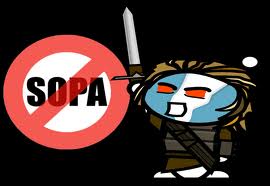"There is nothing new in the realization that
the Constitution sometimes insulates the criminality of a few in order to
protect the privacy of us all."
A quote from
a Supreme Court Justice known for being so conservative that Pat Buchanan looks
like flower child by comparison.
He got it,
so why doesn't the FBI?
Yes I'm talking
about Apple and more specifically Tim Cook's refusal to assist with the unlocking
of an Iphone connected to the San Bernardino terrorist case.
Over the
past week or so I've watched as the FBI, Justice Department and other members
of law enforcement trot out the same tired straw man of national security that
gave us the Patriot Act.
Their
argument is still just as flawed. Worse
it's still based on a fundamental misunderstanding of technology that heralds from
the days of floppy disks and dial-up modems.
The media
coverage hasn't helped either by incorrectly framing the controversy as the
loss of a "back door" in the previous incarnation of IOS ( IOS 7). "Back
doors" are the stuff of 80's flicks like Wargames and Tron not
21st century mobile devices.
Before IOS 8
it's true that Apple did have the capability to unlock an encrypted phone after
being presented with the proper legal
documents. Which was exactly the
position Apple didn't want to be in. By which I mean being constantly pestered by requests to invalidate Apple's own security features.
Not exactly good for business and definitely counter to a more progressive view
of the world.
So with the
advent of IOS 8 Apple removed this capability (and themselves) from the
equation by eliminating the code that allowed them to unlock an encrypted
phone. Well, at least that's what they
thought until San Bernardino happened.
Law
enforcement has long wished for a more "limited" interpretation of
the fourth Amendment. In their view we'd
all be so much safer if only they could just flip a switch and listen in on the
bad guys at a moment's notice.
"The nine most terrifying words in the
English language are: I'm from the Government, and I'm here to help."
 They stop
just short of levying charges of treason when denied such powers but never miss
an attempt to try to shame Apple (or
anyone else that offers some deference to privacy rights) into compliance
by claiming such defiance of the "Rule of Law" only helps criminals
and terrorists.
They stop
just short of levying charges of treason when denied such powers but never miss
an attempt to try to shame Apple (or
anyone else that offers some deference to privacy rights) into compliance
by claiming such defiance of the "Rule of Law" only helps criminals
and terrorists.
"If Apple wants to be the official smartphone of terrorists
and criminals, there will be a consequence"
Here's the
core of the problem....
"Power tends to corrupt and
absolute power corrupts absolutely"
Nobody is
suggesting that criminals or terrorists should be allowed to run about
unhindered. But what happened to good
old fashioned detective work? Edward
Snowden's revelations may now be called "exaggerated" but the fact
remains that there's ample resources available to law enforcement without
potentially short circuiting the 4th Amendment.
The country
was founded on a system of checks and balances for a reason. It extends not only to the three branches of
government but little stuff like trial by jury and the right to not incriminate
one's self.
You're a
fool if you believe that anyone with unfettered access to your private data
isn't going to abuse the privilege.
Remember
Richard Nixon? He had to leave the
presidency precisely because of just such an abuse of power. He felt benevolent leadership required
keeping tabs on everybody.
Nobody
thinks about individual liberties until their own is threatened.
Hey, I'm not
a big fan of Apple or their products.
Personally I don't care much for benevolent overlords that reign over
walled gardens. So I find it ironic that
Tim Cook is on the right side of this issue.
Perhaps it's
because he understands the difference between selling products and selling out civil liberties.
A
distinction the FBI chooses to ignore.






